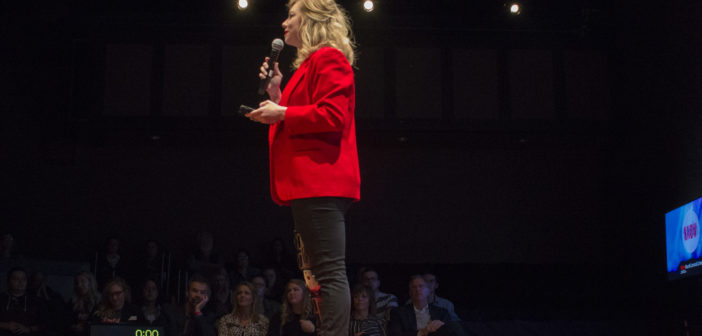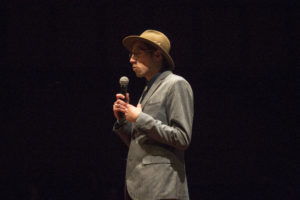NCC alumnus
“Forward: When Better Beats Perfect,” Kai Ruggeri (‘06), assistant professor Columbia University
Ruggeri’s speech revolved around the study of behavioral economics. At the beginning of the speech, Ruggeri illustrated how it was channeled in research on how to reduce energy consumption within a community. Researchers asked people how much energy they used and then presented them with the community average of energy intake. After the study, the study found that those who used above the community average used less in the following months, but the people who originally used less, now increased their consumption. That is what researchers refer to as the “boomerang effect,” a fragment of behavioral economics.
For the next trial, researchers simply either gave a thumbs down to high energy users and a thumbs up to low users. Just that slight change in the study was able to alleviate the boomerang issue. This is an example of how behavioral economics, a small nudge, can change how we make decisions and their outcomes.
It’s a field that could change policy on environment, education and economics, argues Ruggeri. It talks about how changing the way information is presented can change people’s actions. But these nudges never work in dramatic ways, instead the most successful shifts happen little by little.
If we focused that change on a goal rather than a belief, he said, it can lead to a place “where we can come up with small incremental changes that can have a profound effect.”
NCC professors
“Stone Age Science,” Frank Harwath, NCC engineering professor
“How do human beings learn things for the first time?” asked Harwath. For most humans, we think knowledge is someone telling us something. So, how did people in the Stone Age learn with no prior knowledge? Harwath implored that the key is the ability to compare.
”They had to learn to observe and draw conclusions, like migration patterns and where to find berries. They also understood patterns and time,” he said.
Nomads used strategies to help create agriculture and even calendars. How? They observed and tested a hypothesis, what we know now as the scientific method. The method, observes Harwath, predates measurements and mathematics.
“Ultimately, whatever the forces were that made us who we are, we are here to do science,” he said. And to do that, and learn something for the first time, we need to encourage constructive failure and observation.
“The Grammar of Wonder/The Wonder of Grammar,” Jack Shindler, NCC English professor
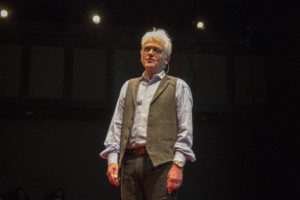 “What actually is wonder, grammatically?” asked Shindler. Well, etymology-wise, we know wonder can be traced back so far, but the actual origin is, in itself, a wonder. But to most of us, grammar has become a four-letter word, said Shindler.
“What actually is wonder, grammatically?” asked Shindler. Well, etymology-wise, we know wonder can be traced back so far, but the actual origin is, in itself, a wonder. But to most of us, grammar has become a four-letter word, said Shindler.
“Look at grammar as a three-letter word: subject, verb and object,” he said. Sentences with intransitive verbs need nothing else, like basic human functions. We need to add wonder to the top of Maslow’s hierarchy of needs. “More than anything else,” Shindler said, “we need to wonder.”
“A Record of Wonder in Great Books,” Stuart Patterson, visiting assistant professor, Shimer Great Books
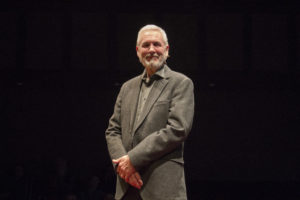 “I’m feeling very self-conscious,” began Patterson. “I want to invite you tonight to share as much of this feeling as you can.” He asked us “to listen to the dead, with our eyes: to read.”
“I’m feeling very self-conscious,” began Patterson. “I want to invite you tonight to share as much of this feeling as you can.” He asked us “to listen to the dead, with our eyes: to read.”
Patterson explored how books can allow us to ask questions like “why life at all?” — what he, along with other philosophers, refer to as “doing the hard labor in the field of thyself.”
Whether Cervantes, Socrates or the book of Job, Patterson said to think about “why is it that we create illusions to come to terms with our reality,” through the confounding power of books.
“Reverence,” Dr. Rebecca Stafford, NCC English professor
Dr. Stafford shared a short poem, a reflection on a loss of innocence and bringing life into the world.
NCC students
“Scar Stories: Fundraising for Cancer,” Samantha Sowa (‘21)
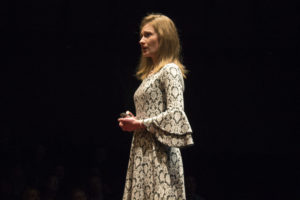 “No child should never have to endure the pain and suffering that goes along with childhood cancer,” said Sowa; and she should know. Sowa was diagnosed with childhood cancer when she was only 11 years old.
“No child should never have to endure the pain and suffering that goes along with childhood cancer,” said Sowa; and she should know. Sowa was diagnosed with childhood cancer when she was only 11 years old.
She spoke about how childhood cancer research is far underfunded in comparison to other cancers, and how the lack of treatments lead to unforeseen consequences. Over 60 percent of survivors have long-term side-effects.
So, Sowa asked, what can we do to help? “Become aware of the facts and statistics,” she said. And get to know a survivor of childhood cancer. “Their scar also has a story, and that story might bring us one step closer to finding a cure.”
“Mind Over (Grey) Matter,” Rachel Davis (‘19)
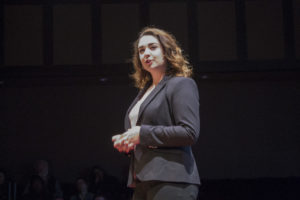 Davis told the story of how she began to learn and think about the capabilities of the human brain after it became very immediate last year: her father was forced to have emergency brain surgery.
Davis told the story of how she began to learn and think about the capabilities of the human brain after it became very immediate last year: her father was forced to have emergency brain surgery.
After the procedure, in response, his brain employed post-traumatic amnesia, where the brain is able to sever memory during a traumatic event and save itself from post-traumatic stress.
“His brain’s strength and resiliency are what ultimately saved his life,” said Davis; and nine months later, Davis’ father sat in the audience to watch her tell the story.
“The Original Social Network,” Ian Brugman (‘19)
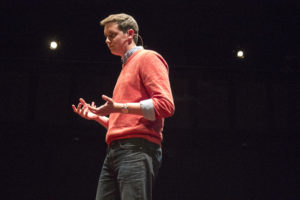 Brugman ask us to consider the paradox of technology: it provides us with vastly more information, but at the cost of neglecting our own social connections.
Brugman ask us to consider the paradox of technology: it provides us with vastly more information, but at the cost of neglecting our own social connections.
“That’s the problem with databases,” said Brugman. “You can only find what you’re looking for.”
Different perspectives and questions can lead to answers we could not have even considered. Maybe, Brugman concluded, you should be “asking yourself who you know, instead of what you know.”
“An Innovative Actuality,” Davonte Sanders-Funches (‘18)
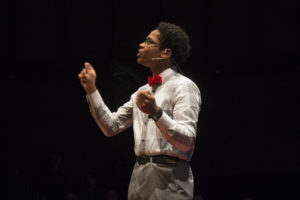 Sanders-Funches delivered a spoken-word poem about the very idea of innovation and the questions that lead us to them.
Sanders-Funches delivered a spoken-word poem about the very idea of innovation and the questions that lead us to them.
By refusing to explore different questions it can get to a state of “knowing it all, but not moving outside of our bounds to wonder,” said Sander-Faunches.
In conclusion
The evening ended with a final song “Body,” from Sleeping At Last, accompanied by photos submitted by everyone in the audience that, in their eyes, encapsulated wonder.

